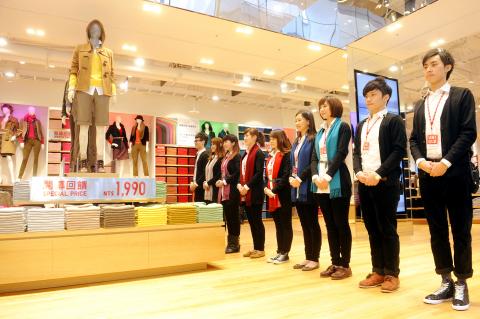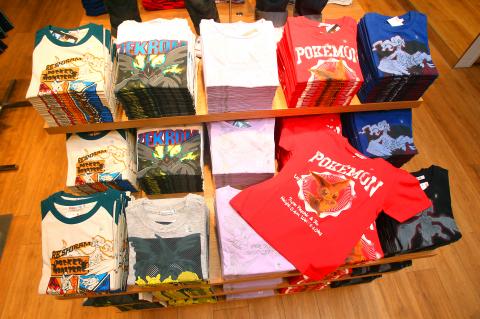Uniqlo, the Japanese T-shirt maker, wanted to change its image, which was seen as drab in its homeland. Part of the solution: recreating the sheen of its New York Fifth Avenue store in Tokyo’s most expensive fashion district — rebranding from the outside in.
On Friday, Uniqlo will open its world’s largest store in Tokyo’s Ginza area. Combined with a shift to use English as its official language and plans to hire more international workers, the strategy is designed to shed Uniqlo’s roots as a budget label that started selling cheap clothing 30 years ago.
“We came from the boonies, a roadside store,” Tadashi Yanai, the 63-year-old president of Uniqlo’s parent, Fast Retailing Co and Japan’s richest man, said last month. “Overseas, our image is that of a global company, but in Japan, we have this legacy issue which we take with us. This roadside image, old image is still in the minds of people and we want to show people the new Uniqlo.”

Photo: Taipei Times
Uniqlo’s efforts to revive its brand at home, where sales fell 2.4 percent last year, are a study in how some Japanese firms are adapting to an aging population and stagnant domestic economy to find new ways of growing. Success may give Fast Retailing a boost in a market that provides more than 80 percent of its US$10 billion in annual revenue and competes with global brands including Zara and H&M.
“The reimporting of their brand image may actually work,” said Mikihiko Yamato, deputy head of research for JI Asia in Tokyo.
In Manhattan, after the success of a Soho outlet, the company set up a glass-fronted corner store on Fifth Avenue, the priciest retail street globally last year, according to Cushman & Wakefield, the commercial real estate services company. It was followed by another store on New York’s 34th Street.

Photo: Taipei Times
After gaining customers around the world, the company decided the quickest way to revamp its image at home was to import the glitz of Fifth Avenue and let Japanese customers “experience the difference,” Uniqlo said in its annual report.
The outlet in Ginza, where rents cost about US$11,238 per square meter last year, according to Cushman & Wakefield, will be a gleaming white rectangular glass-front building of 12 stories.
With floor space of 4,877m2, or almost the same size as an American football field, the new outlet replaces a smaller store and will be manned by a staff of 520. Included in the workforce will be about 100 foreigners from around the world speaking English, Mandarin, Korean, French and Spanish.
“Ginza is the first place foreign brands set up shop when they enter Japan,” said Masamichi Nakamura, executive director at Interbrand Japan, a marketing consultant. “McDonald’s and Starbucks had their very first stores in Ginza.”
In addition to the company’s traditional products such as T-shirts and casual clothes, the new store will sell trendy fashions from its collaborative lineup with the Undercover brand and an exclusive line of outfits created for Kei Nishikori, Japan’s top-ranked tennis player and the world’s No. 17.
For a chain that built its reputation on cheap clothing that anyone could afford, Uniqlo is going to face hurdles convincing Japanese shoppers it’s hip, according to analyst James Moon.
“They have 800-plus stores and they mainly sell basic stuff like underwear” in Japan, said Moon, an analyst for BNP Paribas Equity Research in Tokyo. “They want to sell more to women and to sell more outer wear, and to do that you have to be a little bit more fashionable.”
While Japan provides the bulk of Fast Retailing’s revenue, growth has stalled as hit products like Heattech thermal wear are losing out to similar products sold at cheaper prices by supermarket chains Ito-Yokado and Aeon Co.
Of the brand’s 843 domestic stores, about 60 percent are located by roadsides, mainly in suburban areas, according to the latest annual report. Part of its new strategy at home is to recreate the large, sleek stores that have won it customers abroad with success in Ginza before expanding to other parts of Tokyo and cities such as Osaka and Fukuoka.
The retailer plans to shut some of its smaller stores and build bigger ones that average over 3,252m2. It will also introduce English as its official language of communication to do business around the world.
“If we are to do business globally, we have to do it in English,” said Yanai. “This is the new reality Japan faces.”
Managers have to score above 700 points for their TOEIC, Test of English for International Communication test, and all meetings involving foreigners will be conducted in English. Yanai aims to have foreigners make up half of the 1,000 staff at its main office in Tokyo by 2015.
Bringing the glamour of its New York stores to Japan may help turn around the company’s image, according to Yoshida Kan, a copy writer from Oita prefecture and former customer who shunned Uniqlo’s casual clothes for cheaper alternatives sold by supermarket chains.
“The real meaning of taking the New York Fifth Avenue concept and putting it in Ginza is to assure people that they made the right choice in buying Uniqlo,” said Kan. “Telling people in the boonies that we have a store in New York’s Fifth Avenue and Ginza, so we’re all right.”
Another benefit of bringing a global image back home and setting up in fashionable Ginza: drawing international tourists, particularly those from China.
“I think it will strengthen their image at home and globally, especially Asia,” said Interbrand’s Nakamura.
Uniqlo already has some converts at home.
“If you have fashion sense, you can utilize their products well,” said Yuki Morino, a 22-year-old university student in Tokyo, wearing an orange corduroy shirt and checkered jacket from Uniqlo. “People who say you can’t look fashionable with Uniqlo probably have no sense.”

Cheng Ching-hsiang (鄭青祥) turned a small triangle of concrete jammed between two old shops into a cool little bar called 9dimension. In front of the shop, a steampunk-like structure was welded by himself to serve as a booth where he prepares cocktails. “Yancheng used to be just old people,” he says, “but now young people are coming and creating the New Yancheng.” Around the corner, Yu Hsiu-jao (饒毓琇), opened Tiny Cafe. True to its name, it is the size of a cupboard and serves cold-brewed coffee. “Small shops are so special and have personality,” she says, “people come to Yancheng to find such treasures.” She

Late last month Philippines Foreign Affairs Secretary Theresa Lazaro told the Philippine Senate that the nation has sufficient funds to evacuate the nearly 170,000 Filipino residents in Taiwan, 84 percent of whom are migrant workers, in the event of war. Agencies have been exploring evacuation scenarios since early this year, she said. She also observed that since the Philippines has only limited ships, the government is consulting security agencies for alternatives. Filipinos are a distant third in overall migrant worker population. Indonesia has over 248,000 workers, followed by roughly 240,000 Vietnamese. It should be noted that there are another 170,000

Hannah Liao (廖宸萱) recalls the harassment she experienced on dating apps, an experience that left her frightened and disgusted. “I’ve tried some voice-based dating apps,” the 30-year-old says. “Right away, some guys would say things like, ‘Wanna talk dirty?’ or ‘Wanna suck my d**k?’” she says. Liao’s story is not unique. Ministry of Health and Welfare statistics show a more than 50 percent rise in sexual assault cases related to online encounters over the past five years. In 2023 alone, women comprised 7,698 of the 9,413 reported victims. Faced with a dating landscape that can feel more predatory than promising, many in

Former Chinese Nationalist Party (KMT) chairwoman Hung Hsiu-chu’s (洪秀柱) attendance at the Chinese Communist Party’s (CPP) “Chinese People’s War of Resistance Against Japanese Aggression and the World Anti-Fascist War” parade in Beijing is infuriating, embarrassing and insulting to nearly everyone in Taiwan, and Taiwan’s friends and allies. She is also ripping off bandages and pouring salt into old wounds. In the process she managed to tie both the KMT and the Democratic Progressive Party (DPP) into uncomfortable knots. The KMT continues to honor their heroic fighters, who defended China against the invading Japanese Empire, which inflicted unimaginable horrors on the